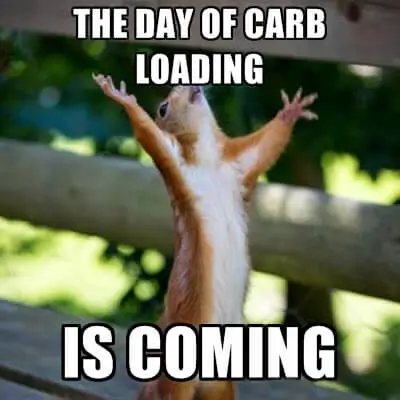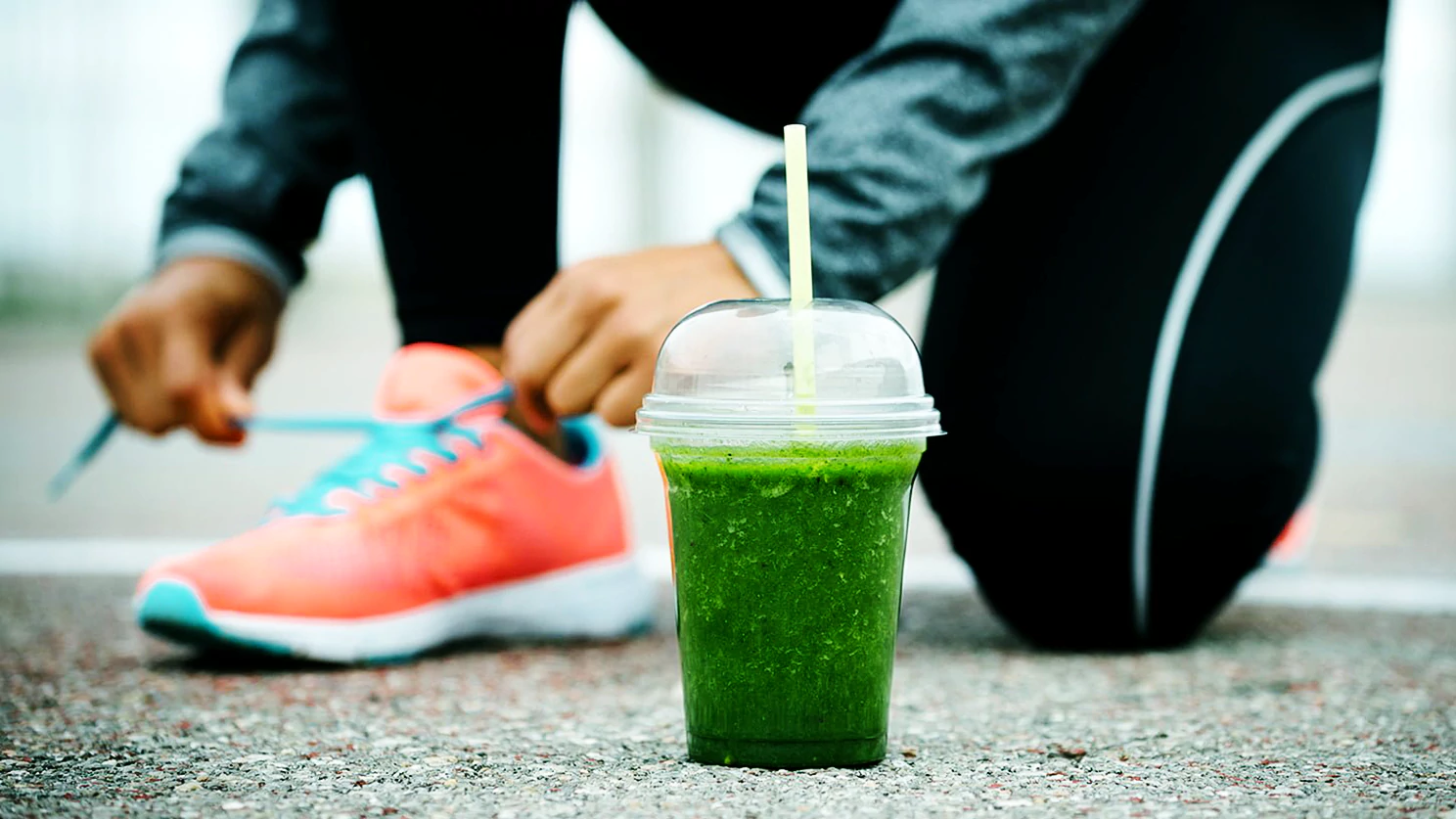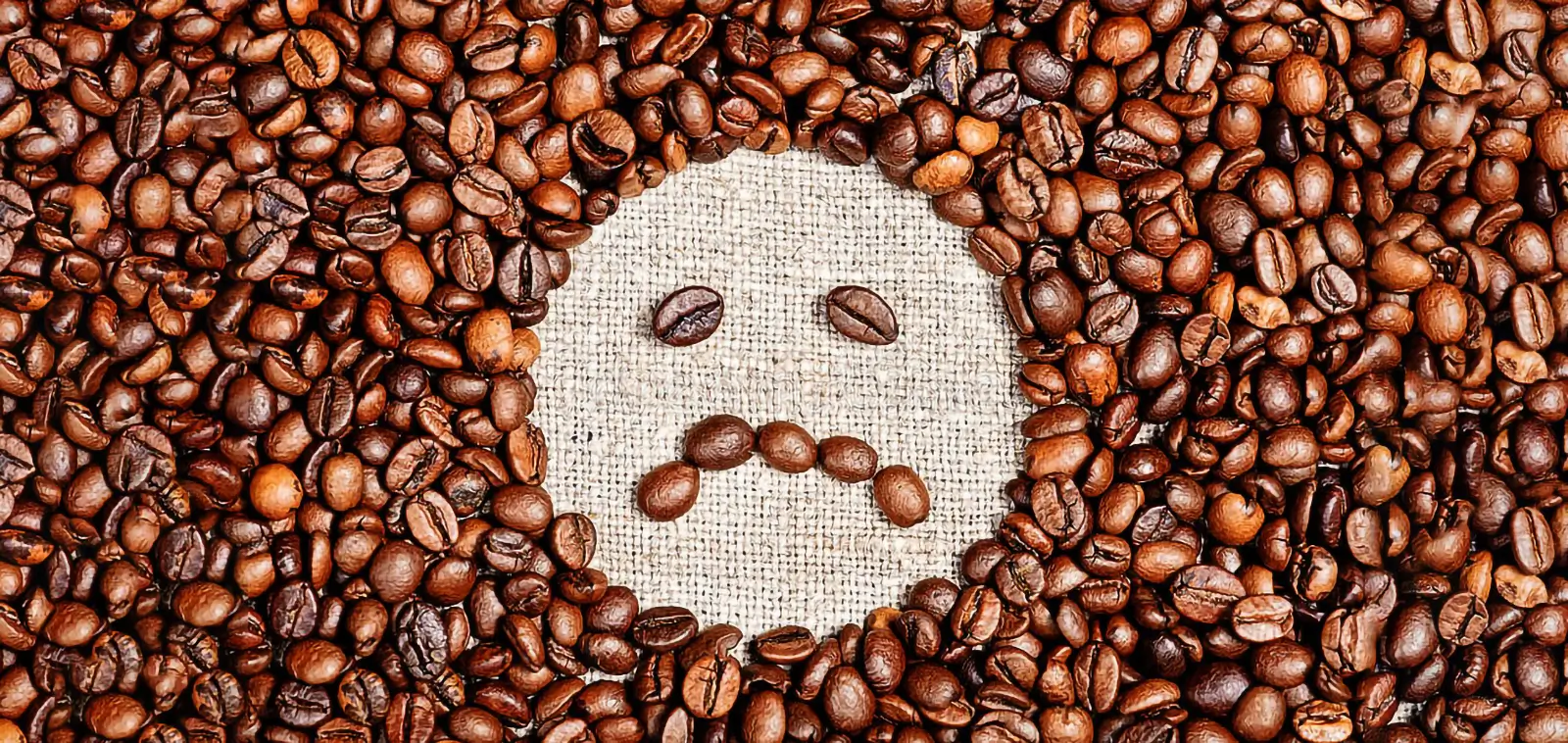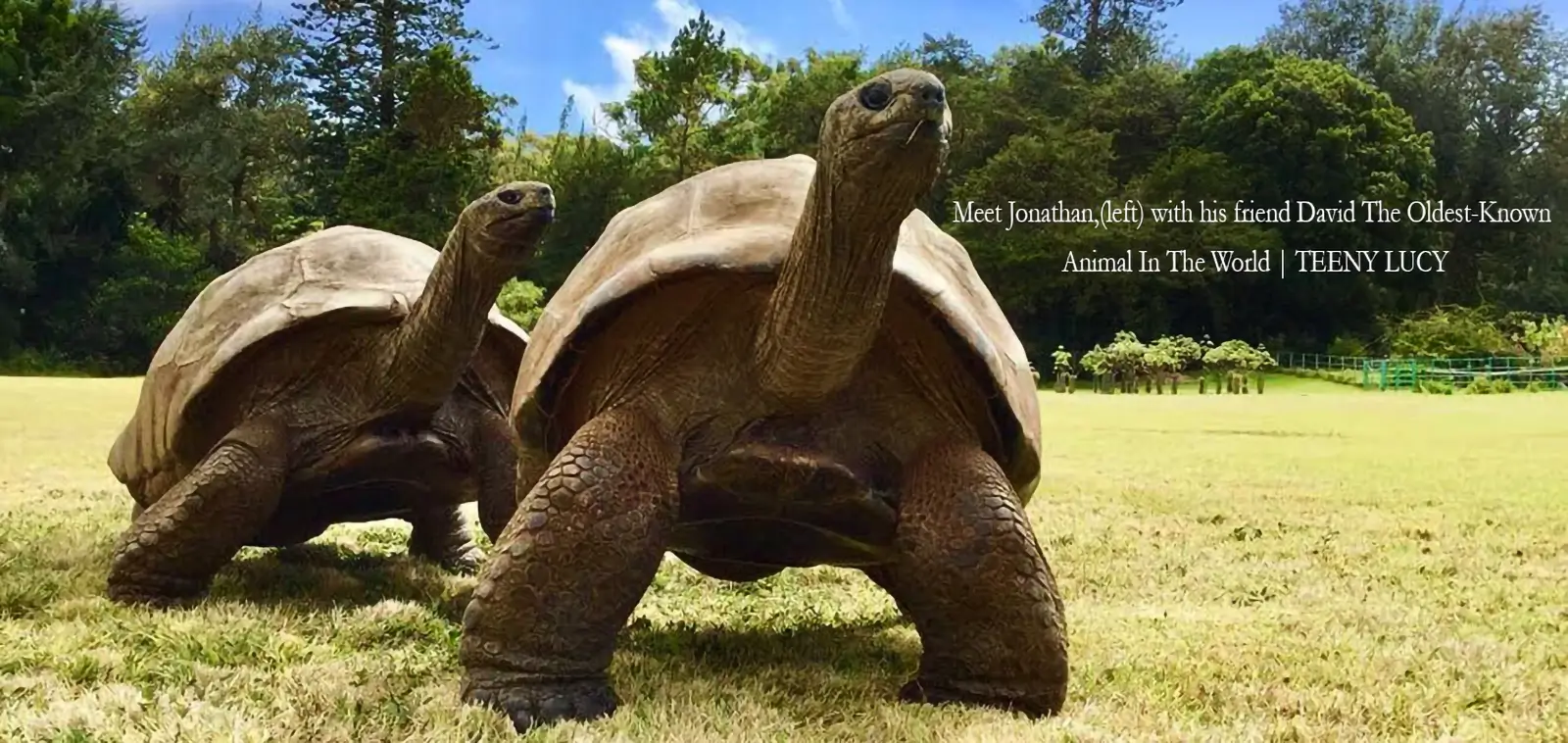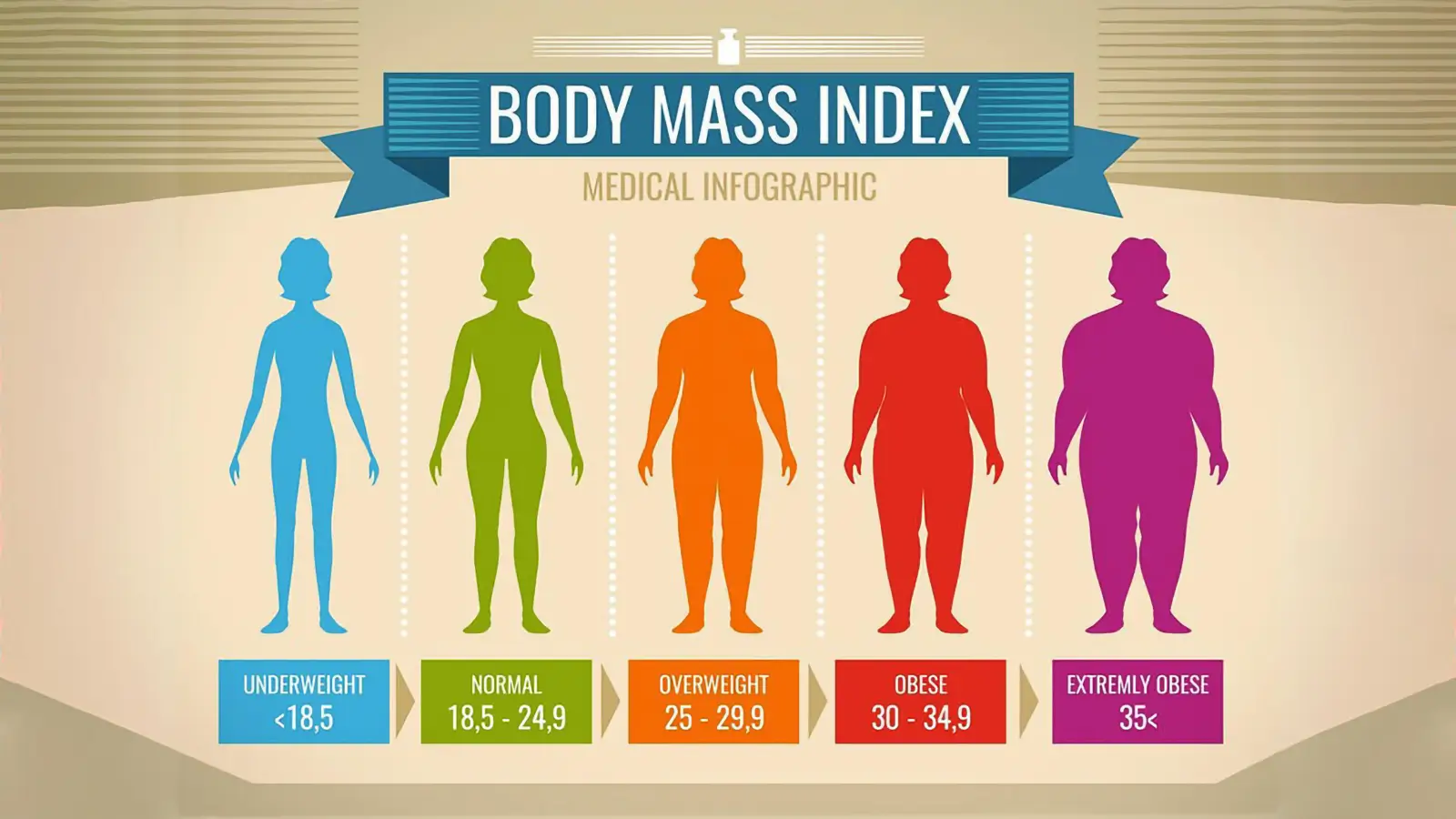グリコーゲンの枯渇 - 運動をしない方法
運動したり、食事制限をするとどうなるでしょうか? グリコーゲン枯渇とは何ですか?それを避けるべきですか? グリコーゲンを枯渇させると何かメリットがあるのでしょうか?
ミロス ポキミカ
によって書かれた: ミロス ポキミカ
医学的に検証した結果 Xiùying Wáng, M.D. 博士。
Updated 5月 29, 2023運動したり、食事制限をするとどうなるでしょうか? グリコーゲン枯渇とは何ですか?それを避けるべきですか? グリコーゲンを枯渇させると何かメリットがあるのでしょうか?
体に何が起こるかというと、(飢餓モードではなく)絶食モードに入るということです。飢餓とは全く異なる状態です。
最初の段階では、体は貯蔵された糖グリコーゲンの形ですぐに利用できるカロリーを燃焼します。脂肪と同じように、私たちの体にはすぐに使用できる糖分(グリコーゲン)が貯蔵されており、簡単に代謝されます。これは瞬時に利用できる素早いエネルギーであり、脂肪とは異なり代謝経路を必要としません。私たちの細胞はグリコーゲンを直接使用します。
糖の大部分は主に肝臓と筋肉の細胞に貯蔵され、水で水分を補給されます。血流で利用可能なエネルギーよりも多くのエネルギーを燃焼し始めると、血糖値が低下します。対策の第一段階では、私たちの体は簡単に入手できる貯蔵エネルギー源、つまり貯蔵されたグリコーゲンを利用します。糖水分子が燃焼するとき、グリコーゲンは細胞内の水で水和されるため、代謝の過剰または副産物です。そのため、最初の段階では水分の重量が若干減ります。
これを知らないと、ダイエット中に水分が失われ、喜んで、後で水分が戻ってきたときに驚くかもしれません。通常、最初の週の劇的な体重減少の原因は、グリコーゲンとナトリウムから放出される水分の損失です。
In the liver, glycogen reserves can build up to 5–6% of the organ’s flesh weight (100–120 grams in an adult). Muscles have a much lower concentration of glycogen, in the range of one to two percent of the total muscle mass.
トレーニングを受けていない人は、通常約 400 グラムのグリコーゲンを保持しており、筋肉と肝臓の両方の全身に蓄えられています。訓練されたプロのアスリートはその2倍の量を保持できます。この量のグリコーゲンは、補充なしで数時間の激しい運動を続けるのに十分です。
トレーニングすると体が適応し、状態が改善します。プロのアスリートも、筋内グリコーゲン貯蔵量を増やすことで体を強制的に適応させるために、運動後に炭水化物ローディングと呼ばれるものを行います。これに関してはいくつかの研究が行われています。カフェインを摂取したり、コーヒーを飲んだりすると、グリコーゲンの貯蔵量がより早く補充される傾向があります。
長距離アスリートはグリコーゲンの枯渇を経験することがよくあります。それを「壁にぶつかる」と言います。プロスポーツでは、糖分が枯渇すると疲労が続き、時には動くのが困難になる場合もあるため、影響が大きくなります。スポーツ選手が大騒ぎするのはこれが理由です。ボンキング(グリコーゲン枯渇)とは、ただ疲れているだけの状態ではありません。ボンキングとは、グリコーゲンの貯蔵量が非常に少なくなり、脳がエネルギーを使い果たし、体が停止することです。
初期段階と容易に利用可能なグリコーゲンの貯蔵量の代謝が完了すると、肝臓は脂肪とタンパク質を分解して直ちにエネルギーを形成し始めます。問題は、このプロセスには時間がかかり、糖新生が始まるまでアスリートは低血糖の症状を経験する可能性があることです。そうなれば、プロスポーツ選手が極度の疲労で倒れるケースも珍しくなくなるだろう。
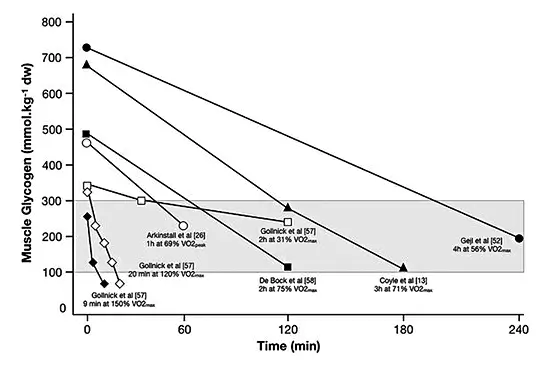
低血糖はめまい、かすみ目、幻覚を伴います。このような状況下では意識喪失も発生する可能性があります。複数の異なるエネルギー源を組み合わせて使用することで、高い筋力出力を長期間維持できるようにすることは、プロスポーツや研究において重要なことです。また、マラソン前に糖新生を利用するためにダイエットをしてから走ることはできません。脂肪だけを燃料源としてマラソンを走ることは現実的ではありません。脂肪をより高い速度で代謝できれば、決して疲れることはなく、無限に走り続けることができます。残念ながら、脂肪代謝のエネルギー効率はそのレベルではありません。
Moreover, our body can only process a limited amount of carbohydrates per hour also, around 30-60 grams depending on individual efficiency. You probably won’t race a marathon, but it is essential to understand how the body works if you want to exercise, you can potentially do yourself damage, or don’t get the desired results.
ボディビルディングにおいては、筋肉量を異化してエネルギーにすることは望ましいことではないため、これは重要なことです。16 時間から 72 時間でグリコーゲンが枯渇すると、体はエネルギー生成のためにアミノ酸とタンパク質の異化に大きく依存します。運動の有無にかかわらず断食を行うとアミノ酸が使用され、筋肉量の一部が失われます。それを最小限に抑えるように努めることはできますが、一部のアミノ酸はエネルギーとして使用されてしまいます。
組織の一部が失われることは、思っているほど深刻ではありません。進化の目的があり、適度に行えば健康上の利点もあります。人間を含むすべての動物が定期的に絶食モードに入るのは正常です。私たちの体は、身体活動に適応してきたのと同じように、進化の過程で断食にも適応してきました。適度な定期的な絶食は、オートファジー (自己食べる) として知られるプロセスで、突然変異して損傷した前がん細胞を浄化するのに役立ちます。細胞が 2 つあり、1 つが損傷し、エネルギーを得るために 1 つを破壊する必要がある場合、体は損傷した細胞を最初に異化して、ある意味自分自身を浄化します。運動や断食を普段の生活に取り入れないと、健康に悪影響を及ぼします。
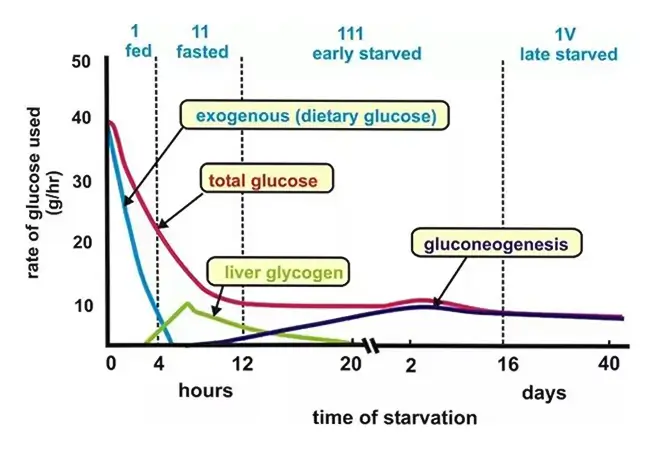
この初期期間を過ぎると、私たちの代謝はケトーシスに移行し、エネルギーのほぼすべてが脂肪代謝によるケトン体から得られます。基礎代謝も下がり、つまりエネルギーの利用効率が良くなります。ダイエットしたいなら、これはあなたが望んでいる状態です。あなたが対処できる量の永久的なカロリー不足です。マラソンを走ったり、速い状態で激しい運動をしたりすることは、脳に食べ物がなくなり、エネルギーとして自分の筋肉組織を使わざるを得なくなるため、それほど有益ではないかもしれません。これは望ましい結果ではありません。
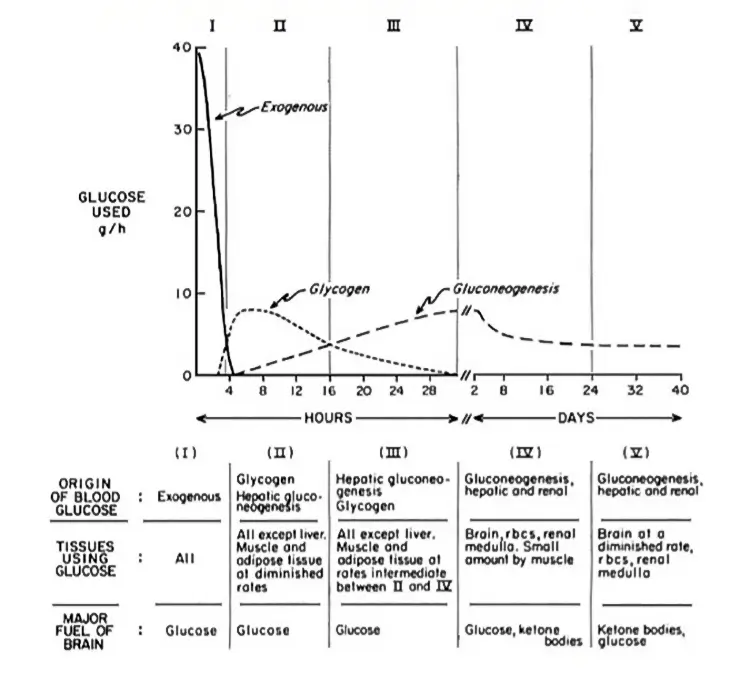
- Feeding – Insulin levels rise during meals. This allows glucose to be absorbed into tissues such as the muscle or brain and used directly for energy. Excess glucose is stored in the liver as glycogen.
- 吸収後段階は、絶食開始から 6 ~ 24 時間後に起こります。インスリンレベルが低下し始めます。グリコーゲンが分解されてエネルギーとなるブドウ糖が生成されます。グリコーゲンの貯蔵は約24時間持続します。
- Gluconeogenesis can take anywhere from 24 hours to 2 days. In a process known as “gluconeogenesis,” the liver creates new glucose from amino acids. This literally translates as “creating new glucose.” Glucose levels in non-diabetics fall but remain within the normal range.
- Ketosis – 2-3 days after fasting begins – The low insulin levels reached during fasting promote lipolysis or the breakdown of fat for energy. Triglycerides, the fat storage form, are composed of a glycerol backbone and three fatty acid chains. Glycerol is used in the process of gluconeogenesis. Many tissues in the body can use fatty acids directly for energy, but not the brain. Ketone bodies, which can cross the blood-brain barrier, are synthesized from fatty acids and used by the brain. Ketones provide approximately 75% of the energy used by the brain after four days of fasting. The two major types of ketones produced are beta-hydroxybutyrate and acetoacetate, both of which can increase by more than 70 percent during fasting.
- タンパク質保存フェーズ。高レベルの成長ホルモンは、筋肉量と無駄のない組織を維持するのに役立ちます。基礎代謝を維持するために必要なエネルギーは、ほぼすべて遊離脂肪酸とケトン体によって供給されます。ノルアドレナリン(アドレナリン)レベルの増加により、代謝率の低下が防止されます。
The human body has well-developed mechanisms for dealing with hunger. In essence, what we are describing here is the process of transitioning from burning glucose to burning fat. That is it. Fat is simply stored food energy in the body. When there is a scarcity of food, stored food is naturally released to fill the void. So, no, the body does not ‘burn muscle’ to feed itself until all fat stores are depleted. There will be some catabolism at acceptable levels if you don’t have diabetes. In situations where there is hypoglycemia for survival, our body will burn everything to preserve brain cells from dying. If you don’t have hypoglycemia then no the body will not burn muscle but fat.
元々の脂肪の量にもよりますが、水を飲むだけで 2.5 ~ 3 か月間生き続けることができます。脂肪が多量にあれば、私たちはずっと長く生きられますが、栄養欠乏が起こります。このため、低カロリーで栄養価が高く、全繊維が豊富な食品があらゆる食事のベースとなります。
この良い例は、アンガス・バルビエリという男性です。 医師の監督下で1年間水断食をした人 勉強 (スチュワートと 1973年に)。彼にはビタミンサプリメントのみが与えられました。カロリーもプロテインもなし。

参考文献:
- マレー、B.、ローゼンブルーム、C. (2018)。コーチとアスリートのためのグリコーゲン代謝の基礎。 栄養学のレビュー, 76(4)、243–259。 https://doi.org/10.1093/nutrit/nuy001
- SG のインピー、MA のハリス、KM のハモンド、JW のバートレット、J. ルイス、GL のクローズ、JP のモートン (2018)。必要な作業の燃料: 炭水化物のピリオダイゼーションとグリコーゲン閾値仮説の理論的枠組み。 スポーツ医学, 48(5)、1031–1048。 https://doi.org/10.1007/s40279-018-0867-7
- Stewart, W. K., & Fleming, L. W. (1973).382日間にわたる治療的断食の成功の特徴。 大学院医学雑誌, 49(569)、203–209。 https://doi.org/10.1136/pgmj.49.569.203
関連記事
栄養と健康について何か質問はありますか?
ぜひご意見をいただき、次回の投稿でお答えしたいと思います。皆様のご意見とご意見に感謝しており、すぐにご連絡をお待ちしております。私もあなたを招待します フォローする Facebook、Instagram、Pinterestでダイエット、栄養、健康に関するコンテンツをご覧ください。そこにコメントを残して、他の健康愛好家とつながり、あなたのヒントや経験を共有し、私たちのチームやコミュニティからサポートや励ましを得ることができます。
この投稿があなたにとって有益で楽しいものであり、学んだ洞察を生かす準備ができていることを願っている。この投稿が役に立ったと思われた方は シェアする 友人や家族など、その恩恵にあずかれるかもしれない人たちと一緒に。誰が健康の旅にガイダンスやサポートを必要としているかわからないのですから。
– あなたはおそらくそれも好きでしょう –

栄養について学ぶ
ミロス・ポキミカは、自然医学の医師、臨床栄養士、医療健康と栄養のライター、栄養科学アドバイザーです。書籍シリーズの著者 ビーガンに行きますか?科学の復習また、自然健康サイト「GoVeganWay.com」を運営している。
医療上の免責事項
GoVeganWay.com では、最新の栄養と健康関連の研究のレビューをお届けします。提供される情報は著者の個人的な意見を表すものであり、専門的な医学的アドバイス、診断、または治療に代わることを意図または暗示するものではありません。提供される情報は情報提供のみを目的としており、資格のある医師または医療提供者の相談、診断、および/または治療に代わるものとして機能することを意図したものではありません。GoVeganWay.com で読んだことや GoVeganWay.com を通じてアクセスしたことを理由に、専門家の医学的アドバイスを無視したり、医療治療を受けるのを遅らせたりしないでください。
認可された医師に相談する前に、GoVeganWay.com で読んだ内容の結果としてライフスタイルの変更や変更を決して適用しないでください。
医療上の緊急事態が発生した場合は、直ちに医師または 911 に電話してください。GoVeganWay.com は、内部で言及されている特定のグループ、組織、検査、医師、製品、手順、意見、またはその他の情報を推奨または承認しません。
編集者のおすすめ –
ミロス・ポキミカは、自然医学の医師、臨床栄養士、医療健康と栄養のライター、栄養科学アドバイザーです。書籍シリーズの著者 ビーガンに行きますか?科学の復習また、自然健康サイト「GoVeganWay.com」を運営している。
最新記事 -
プラントベースのニュース
-
Hyundai Partners With UNCAGED To Develop Leather Alternatives For Car Interiors
on 9月 15, 2025
-
6 High-Protein Sheet Pan Meals
on 9月 14, 2025
-
Vegan Athlete Wins European Strongman Games And Static Monsters, Sets New World Record
on 9月 14, 2025
-
Herbal Teas To Boost Energy, Immunity, Sleep, And Love
on 9月 13, 2025
-
Make Your Own Plant Based Alfredo Sauce
on 9月 13, 2025
-
Vegan Steakhouse In Wales Says It Will ‘Never Go Back’ To Serving Meat
on 9月 13, 2025
-
‘I Ate Chia Seeds Every Day For A Month’ – Plus Results
on 9月 12, 2025
トップヘルスニュース — ScienceDaily
- Daily eye drops could make reading glasses obsoleteon 9月 15, 2025
Eye drops combining pilocarpine and diclofenac helped patients read extra lines on vision charts, with effects lasting up to two years. The treatment could revolutionize presbyopia care as a safe, non-surgical alternative to glasses.
- Half of adults suffer from dry eyes, but most never get helpon 9月 15, 2025
Dry eyes are far more common than previously believed, with over half of adults in the US and Europe experiencing symptoms, yet most remain undiagnosed for years. The large-scale NESTS study reveals that sufferers often endure daily discomfort that disrupts work, driving, and even surgery outcomes. Many accept the condition as part of aging, unaware that simple treatments could provide relief.
- Cannabis use may quadruple diabetes riskon 9月 15, 2025
A massive study of over 4 million adults has revealed that cannabis use may nearly quadruple the risk of developing diabetes. Despite some earlier suggestions that cannabis might have metabolic benefits, this large analysis found significantly higher diabetes rates among users, even after adjusting for other health factors.
- Being too thin can be deadlier than being overweight, Danish study revealson 9月 15, 2025
New research from Denmark challenges long-held assumptions about body weight and health, revealing that being overweight—or even moderately obese—does not necessarily increase the risk of death compared to those at the upper end of the “normal” BMI range. In fact, those who are underweight or at the lower end of the so-called healthy spectrum faced higher risks.
- 1 in 8 Americans have already tried Ozempic and similar weight loss medicationson 9月 14, 2025
GLP-1 drugs like Ozempic have transformed weight loss in the U.S., with nearly 12% of Americans having tried them, according to a new RAND report. Usage is especially high among women aged 50 to 64, while men catch up in older groups. Despite effectiveness, side effects like nausea and diarrhea are common, and most Americans say they don’t plan to take them.
- Sleepless nights may raise dementia risk by 40%, Mayo Clinic revealson 9月 14, 2025
Chronic insomnia may do more than leave you groggy, it could speed up brain aging. A large Mayo Clinic study found that people with long-term sleep troubles were 40% more likely to develop dementia or cognitive impairment, with brain scans showing changes linked to Alzheimer’s. Those reporting reduced sleep showed declines comparable to being four years older, while certain genetic risk carriers saw even steeper drops.
- AI can now predict who will go blind, years before doctors canon 9月 14, 2025
Researchers trained AI on tens of thousands of eye scans, enabling doctors to predict which keratoconus patients need early treatment and which can be safely monitored, cutting down on unnecessary procedures while preventing vision loss.
パブメッド、 #ビーガンダイエット –
- Evaluating the Impact of Lactobacillus acidophilus on Fusarium Mycotoxins in Raw Vegan Pumpkin-Sunflower Seed Flour Blendson 9月 13, 2025
A blend with pumpkin and sunflower seed flours was prepared and dried at 41.5 °C for 5 h to create a minimally heat-treated blend for a raw food diet. The blend was inoculated with Lactobacillus acidophilus and Fusarium langsethiae to assess the effect of L. acidophilus on Fusarium growth and mycotoxin production. Drying did not affect the content of naturally occurring microorganisms but significantly reduced water activity (p
- Connections Between Diet and Mental Health: Comparing Participants Randomized to Vegan and Omnivorous Diets in the Nutritious Eating With Soul (NEW Soul) Studyon 9月 12, 2025
Research on vegan diets and mental health shows mixed results but most of the studies have been cross-sectional and among white populations. This study examined changes in perceived stress and mental wellbeing among African American adults aged 18-65 years (N = 159) with overweight/obesity, who were randomized to vegan or omnivorous diets in a 2-year nutrition intervention. Changes in outcomes were assessed using intent-to-treat analysis with mixed model repeated measures. Both groups…
- Bone and mineral metabolism in 2-7-year-old Finnish children and their caregivers following vegan, vegetarian, and omnivorous dietson 9月 11, 2025
CONCLUSION: Linear trends towards increased bone catabolism among children and accelerated bone turnover among adults following PBDs were observed despite adequate vitamin D status and approximately adequate calcium intake. The role of lower protein intake and calcium bioavailability in PBDs and bone health requires further investigation.
- Knowledge of and attitudes towards vegan and vegetarian diets amongst students at a university located in rural Polandon 9月 8, 2025
Background: Healthy plant-based diets, such as vegan and vegetarian diets, as well as planetary health diets, meet the recommendations of sustainable dietary patterns and are healthier for both the planet and humans. The adoption of these dietary patterns may depend on socio-demographic factors and individual motivations. Aim: This study aimed to analyse the association between socio-demographic factors and knowledge and attitudes towards vegan and vegetarian diets amongst university […]
- The association between ‘Vegetarian for Life’ diet quality, social connection and depressive symptoms within Western and Indian regional groupson 9月 5, 2025
CONCLUSIONS: The results underscore the importance of considering socio-cultural dimensions to adherence to dietary patterns, the context of dietary quality and social connection when examining depressive symptoms.
ランダムな投稿 –
おすすめの投稿 -

PubMed の最新情報、 #植物ベースの食事 –
- Perspectives in the Scientific Literature on the Barriers and Benefits of the Transition to a Plant-Based Diet: A Bibliometric Analysisby Lelia Voinea on 9月 13, 2025
Plant-based diets are increasingly attracting attention as they play a significant role in human health and environmental sustainability and are believed to be key components of sustainable food systems. In the present study, both pros and cons of the adoption of plant-based diets are analyzed using a bibliometric method integrated with a qualitative examination of the scientific literature. For the bibliometric study, Bibliometrix software was utilized, examining 3245 scientific articles,…
- A Plant-Based Strategy for MASLD: Desmodium caudatum (Thunb.) DC. Extract Reduces Hepatic Lipid Accumulation and Improves Glycogen Storage In Vitro and In Vivoby Yu-Ching Chen on 9月 13, 2025
Metabolic dysfunction-associated steatotic liver disease (MASLD) is characterized by hepatic lipid accumulation and insulin resistance, yet effective therapies remain limited. This study evaluated the hepatoprotective effects of Desmodium caudatum (Thunb.) DC. Extract (DCE) in vitro and in vivo. In 600 μM oleic acid (OA)-challenged HepG2 cells, DCE (25, 50, and 100 μg/mL) reduced lipid accumulation, oxidative stress, and glycogen depletion by modulating lipogenic and oxidative pathways. In […]
- The Impact of Different Dietary Patterns on Mortality and Prognosis After Non-Metastatic Prostate Cancer Diagnosis: A Systematic Reviewby Thaw Htet on 9月 13, 2025
Objective: The aim of this systematic review was to compare the impact of various dietary patterns on cancer mortality, recurrence, remission, quality of life, and prostate-specific antigen (PSA) in non-metastatic prostate cancer patients. Methods: Ovid Medline, EMBASE, Cochrane Central Register of Controlled Trials (CENTRAL), and Scopus databaseswere searched from inception to March 2024. Dietary interventions or observational studies investigating dietary patterns in men with non-metastatic…
- Nutritional Intervention for Sjögren Disease: A Systematic Reviewby Fernanda Luiza Araújo de Lima Castro on 9月 13, 2025
Background/Objectives: The impact of nutritional interventions on Sjögren disease (SD) remains uncertain, and no standardized guidelines currently exist for managing its sicca symptoms. This systematic review evaluated the effects of dietary interventions on the symptoms of dry mouth and dry eyes in individuals with SD. Methods: Electronic searches were performed in four databases, supplemented by manual searches and searches of the gray literature. Both human and animal studies were […]
- Plant-Based Dietary Patterns and the Risk of Cardiovascular Disease in Middle-Aged Korean Adults: A Community-Based Prospective Cohort Studyby Chaeyoung Park on 9月 13, 2025
Background/Objective: Plant-based diets are gaining global attention for their positive impact on health and sustainability; however, the nutritional value and health effects differ across plant food categories. We investigated the association of three plant-based diet indices and incident cardiovascular disease (CVD) and its subtypes. Methods: This study consisted of 10,030 Korean adults aged 40-69 years from the Korean Genome and Epidemiology Study (KoGES) in Ansan and Ansung. Using a…
- The Association Between the Mediterranean Diet and Fatty Acids in Red Blood Cells of Spanish Adolescentsby Nicolas Ayala-Aldana on 9月 13, 2025
Objective: The Mediterranean diet (MedDiet) is characterized by its emphasis on plant-based foods, olive oil, and fish products, and has been associated with providing relevant fatty acids (FAs) for adolescent physiology. This study aims to investigate the relationship between adherence to the MedDiet and the FA composition of red blood cell (RBC) membranes in an adolescent population. Methods: The current research examines the relationship between MedDiet adherence, assessed using the KIDMED…
